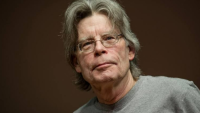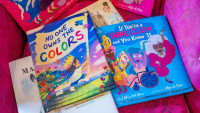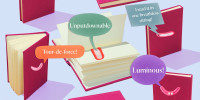
13 Best Writing Tips From Stephen King
timesnownews.com – Saturday October 7, 2023

Stephen King is one of the contemporary era's most successful authors. In this article, we'll take a look at 13 of his best writing techniques, drawn from his book On Writing: A Memoir of the Craft as well as interviews and lectures. These suggestions will help you enhance your writing abilities, whether you are a novice or an experienced writer.
Building a writing life
eu.sctimes.com – Sunday October 1, 2023
For the past 45 years, I have written almost every day. I make my living as a fulltime freelance writer, which I‘ve wanted to do since seventh grade, when I wrote my first very short book titled "The Secret of the Lost Inca Mines." What could be greater than making up stories and getting paid for them, I thought. Almost everything I’ve written for the past 40 years has been published.
I’ve written features, interviews, anecdotes, poetry, short stories, even a play, for magazines as Toy Farmer, Reader’s Digest, Houseboat, Arizona Highways, Saturday Evening Post, Sr. Perspective, and 240 others.
But my most potent joy has emanated from writing essays. They require me to think, often deeply, to dig the ore of words from the rock, and tumble them in order onto the paper to make the piece work. Or sometimes dig out diamonds of exactly the right words that add beauty, and make the sentences sing.
It’s satisfying to discover that many people like what I write, or how I write it. But that was not always so. My career began inauspiciously. In 1977 I resigned from teaching English to be a writer. Though I had never sold a single piece of writing, I was sure I knew enough and was good enough now that I could make my living at writing.

The Art of Writing
altaonline.com – Monday September 25, 2023

Each month, noted authors join Alta Journal’s California Book Club to discuss their work during a free online gathering. Here are some insights into their craft, in eight of the authors’ own words.
JULIE OTSUKA ON SYMBOLISM
“If you let your unconscious write a story, then these symbols will emerge without you really realizing what it is that you’re doing. It’s always fun when people see things in your work that you didn’t—you weren’t even aware of doing. Just because you didn’t realize that your symbolism was working in a certain way doesn’t mean that it’s not there. But that’s what I love about the act of reading. Every reader brings something different to the work.”
STEPH CHA ON RESEARCH
“One of the ways I researched [Your House Will Pay], because I actually don’t really like research, is I just talked to people as I ran into them.… People hold on to all these stories, and they’re not even necessarily holding on to them tightly.… Sometimes they’re just waiting for people to ask. But I think something that I’ve learned by writing crime fiction is just how close all of this hurt and violence is to the surface for so many people and how it’s just a part of our lives that is waiting to be uncovered.”

Screenwriter David Hannam shares tips for would-be TV writers
artshub.com.au – Sunday September 24, 2023

Screenwriter and producer David Hannam has a slate of original projects in development in Australia and the UK. He is a writer and executive producer on Acorn’s first Australian original drama Darby and Joan, starring Bryan Brown and Greta Scacchi, which was released in August 2022 to critical acclaim. He is currently developing season two, after consulting and writing for Paramount+ music industry thriller Paper Dolls.
Here, he shares some tips and tricks of the trade ahead of a Masterclass with Media Mentors Australia.
How and when did you get into writing for screen (and was it always an ambition of yours)?
My writing career is a fortunate accident. In a biopic, it’d go something like this …

It’s About Time!
altaonline.com – Wednesday September 20, 2023

Heed the advice of some literary heavyweights to create an ideal writing routine.
The perfect writing routine! Every writer dreams of it, and every writer knows, deep down, that there is no such thing. There are simply too many variables at play—ambition, temperament, material circumstances—to reach a one-size-fits-all solution. But! Could one identify the building blocks of the perfect routine, to be applied to individual writing practices on an ad hoc basis? Here is an attempt, with copious supporting examples.
RULE NO. 1: SCHEDULE DISCRETE FOCUS BLOCKS
Writers with day jobs may fantasize about having long expanses of unstructured creative time, but let’s be honest: there is no greater drag upon a writing practice than having the full day available for it, which practically guarantees a long, flabby drift rather than a focused effort.
In a practice that is all about increments of labor, the first step is to define your daily dose.

Traditional Publishing in the 2020s
By G. Miki Hayden
Instructor at Writer's Digest University online and private writing coach
firstwriter.com – Friday September 15, 2023

Don’t abandon all hope ye who want to enter into traditional publishing this decade, but you might consider changing what you’re looking for.
I recently had an article covering self-publishing on this site, for which I interviewed some writers who have been self-publishing. I wanted then to discuss what we call “traditional publishing” and thought about who I might interview for such a piece.
Indeed, I know people who publish traditionally, but the idea of interviewing most seemed useless because they have been putting out their books in the mainstream for quite a while, decades in some cases. Talking to them wouldn’t give the great majority of us who wish we were in their shoes much information. And much of traditional publishing still follows the same model, but it has changed.
So let’s start with what traditional publishing is. The authors are the supplicants, first-off to gain an agent who knows the publishers and their needs and will sell for the selected clients.

To hell with woke publishers
spiked-online.com – Wednesday September 13, 2023

The gatekeepers of the creative industry are riddled with a nasty strain of identity politics.
ASH Literary is on the hunt for budding children’s book authors. ‘We are actively seeking voices that have historically been underrepresented’, the submissions section of the agency’s website tells us. ‘For example, we are not interested in stories about white, able-bodied [Second World War] evacuees, but would welcome that story from a disabled, LGBTQ+ or BIPOC [black, indigenous or people of colour] perspective’, it explains.
Leaving aside for a moment the big question of what on Earth the term ‘indigenous’ could possibly mean in a British context, this reads like a sophomoric parody of the modern publishing industry. But I’m afraid it is real. And when we stop laughing at the thought of a blue-haired ‘nonbinary’ stepping nervously off a train at a remote rural station in 1940 – which would be rather like Neville Chamberlain bopping along to some Chiptune – there is something quite troubling about this stuff, uncovered among other examples by Charlotte Gill in the Sunday Telegraph.
The nub of things comes a little later on the same page of the ASH agency’s site, which reads: ‘If your book is about an identity that is not yours, we will not be a good fit.’ What a grim traducement of the power and the purpose of literature – of humanity, even – that nasty little sentence is.

'A Plague on the Industry': Book Publishing's Broken Blurb System
esquire.com – Thursday September 7, 2023

Do authors actually like the books they endorse—or even read them? Writers, literary agents, and publishing workers take Esquire inside the story of a problematic "favor economy."
When an author I’d worked with a decade ago at Simon & Schuster emailed me asking if she could send over an advance copy of her new novel, I of course said yes. But what really got me to read her book over all of the many unread books in my apartment was this quote from mystery writer S.A. Cosby on the cover: “Polly Stewart's The Good Ones is a fantastic achievement. A classic Southern Gothic tale told through the prism of modern-day sensibilities. Not to be missed.”
Having been unable to stop thinking about Cosby’s heartbreaking thriller Razorblade Tears ever since I read it, I inherently trusted him to guide me to my next great summer read (spoiler alert: he was right).
That quote from Cosby is what’s known as a book blurb, or more commonly, just a blurb. These endorsements from other authors or relevant notables are included on book covers, press releases, bookseller letters, and other promotional materials both before and after publication. Requests for blurbs are commonly made author-to-author or otherwise put into motion through their editors or agents ahead of publication, as soon as the manuscript is ready to send out—the earlier, the better.
On their surface, book blurbs seem fairly innocuous, but in reality, they’re a small piece of the puzzle with a big impact—one that represents so much of what’s broken within the traditional publishing establishment. Blurbs expose this ecosystem for what it really is: a nepotism-filled system that everyone endures for a chance of “making it” in an impossible industry for most. To borrow a phrase from Shakespeare enthusiast Cher Horowitz, “Blurbs are a full-on Monet. From far away, they’re okay, but up close, they’re a big old mess.”

This sinister censorship agenda in the publishing world should trouble us all
standard.co.uk – Wednesday September 6, 2023

Hard on the heels of the news that Ian Fleming’s publishers have “edited” its new edition of the James Bond novels to coincide with the 70th anniversary of Casino Royale (a cracker) to omit some non-current references to race, there arrives a new version of James Bond. On His Majesty’s Secret Service, by Charlie Higson, is Bond as a sensitivity reader might have created him.
As The Spectator reviewer observed, “our hero has somehow become the modern age in arms, a Centrist Dad with a sidearm.” Instead of bad Bond, we get 21st century Bond. Whaddya know? He’s rubbish.
The problem with the censorship of contemporary publishing is twofold: one is that it happens upstream, at the commissioning, writing stage of a book.
The other is that when it comes to the censorship of existing authors, it’s like additives in foodstuffs; you have to read the small print to find it’s there. So, with the edited Bond, you have to be bothered to read the publisher’s note that “This book was written at a time when terms and attitudes which might be considered offensive by modern readers were commonplace”. If you’re buying it on Amazon, what chance that you’ll know that you’re getting an expurgated version? What you actually need is a big fat sticker on the front saying: CENSORED.
The Best Global Magazines for Growing Writers and Artists
theteenmagazine.com – Saturday September 2, 2023
Scrolling on Instagram for several hours at a time, to try and get your work recognized? I might have the perfect way for you to get your work recognized while saving your time, simultaneously! Often, the best way to get your creative work to as many people as possible is by submitting to growing magazines.
Yes, it may seem like doing so won't do much good to your work, but trust me, growing magazines are the ones that will eventually rise to the top. With eye-catching aesthetics and magnificent formatting, global magazines are the perfect opportunity for growing writers and artists to showcase their excellent work to the WORLD!
I have personally submitted to a few global magazines myself, such as the Curio Cabinet Magazine and the Poetic Reveries. There is nothing that can match the happiness a writer gets when they see their name in a published magazine with several other talented writers.
Not only is it a great feeling, but it allows you to feel so much better about your skill and, if anything, rejections only strengthen your perspective! At least that is what my major takeaway from reaching out to these thriving magazines was and I hope you, too, step outside of your comfort zone and try these growing, youth-led poetry and art magazines out!
So, here they are, the top five thriving global magazines from the ever-trending platform for skilful, creative and outstanding writers and artists, Instagram.
Get the free newsletter | Submit a news item or article | Get Writers' News for your website





